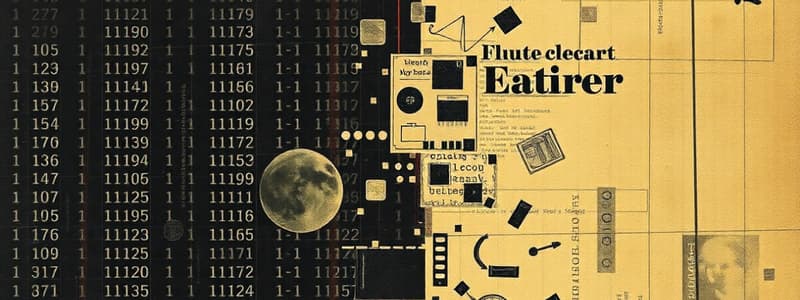Podcast
Questions and Answers
What is the smallest convenient chunk of storage in most computers?
What is the smallest convenient chunk of storage in most computers?
- Word
- Kilobyte
- Byte (correct)
- Bit
Which of the following correctly defines a kilobyte?
Which of the following correctly defines a kilobyte?
- 256 bytes
- 1,000 bytes
- 1,048,576 bytes
- 1,024 bytes (correct)
What is the relationship between bits and bytes in computer storage?
What is the relationship between bits and bytes in computer storage?
- 1 byte equals 4 bits
- 1 byte equals 8 bits (correct)
- 1 byte equals 2 bits
- 1 byte equals 16 bits
Which term is generally used to describe the native unit of data in computer architecture?
Which term is generally used to describe the native unit of data in computer architecture?
What is commonly rounded off to say that 1 gigabyte is approximately how many bytes?
What is commonly rounded off to say that 1 gigabyte is approximately how many bytes?
What is generally considered the slowest method of running computer languages that are not compiled to native code?
What is generally considered the slowest method of running computer languages that are not compiled to native code?
Which virtualization method allows a Virtual Machine Manager (VMM) to run natively?
Which virtualization method allows a Virtual Machine Manager (VMM) to run natively?
What is a common use case for virtualization in computing environments?
What is a common use case for virtualization in computing environments?
Which of the following is NOT a type of network commonly used in distributed systems?
Which of the following is NOT a type of network commonly used in distributed systems?
What advantage is associated with multiprocessor systems?
What advantage is associated with multiprocessor systems?
What is the primary role of a Network Operating System in a distributed system?
What is the primary role of a Network Operating System in a distributed system?
What is a key characteristic of a virtual machine hosted by VMware running Windows XP?
What is a key characteristic of a virtual machine hosted by VMware running Windows XP?
Which communication method is most commonly associated with distributed systems?
Which communication method is most commonly associated with distributed systems?
Which of the following operating systems are available in both source and binary formats?
Which of the following operating systems are available in both source and binary formats?
What advantage does open-source availability of operating systems provide?
What advantage does open-source availability of operating systems provide?
What is a significant impact of virtualization technology in relation to operating systems?
What is a significant impact of virtualization technology in relation to operating systems?
What does the open-source movement allow students to do in terms of operating system development?
What does the open-source movement allow students to do in terms of operating system development?
What is one major limitation that used to exist before the rise of open-source operating systems?
What is one major limitation that used to exist before the rise of open-source operating systems?
Which of the following tools is mentioned as a way to run multiple operating systems without dedicated hardware?
Which of the following tools is mentioned as a way to run multiple operating systems without dedicated hardware?
Why is open-sourcing of non-commercially viable operating systems important?
Why is open-sourcing of non-commercially viable operating systems important?
What online resource is mentioned for finding open-source operating system projects?
What online resource is mentioned for finding open-source operating system projects?
What distinguishes mobile operating systems from traditional laptops?
What distinguishes mobile operating systems from traditional laptops?
Which statement about client-server computing is correct?
Which statement about client-server computing is correct?
Which feature is characteristic of peer-to-peer (P2P) architecture?
Which feature is characteristic of peer-to-peer (P2P) architecture?
What is a primary characteristic of cloud computing?
What is a primary characteristic of cloud computing?
Which of the following is a key feature of mobile applications enabled by modern operating systems?
Which of the following is a key feature of mobile applications enabled by modern operating systems?
In client-server models, what is the primary role of a file-server system?
In client-server models, what is the primary role of a file-server system?
Which statement accurately describes the nature of nodes in a P2P network?
Which statement accurately describes the nature of nodes in a P2P network?
Which technology forms the basis for cloud computing functionality?
Which technology forms the basis for cloud computing functionality?
What is required for a process to execute properly in terms of resources?
What is required for a process to execute properly in terms of resources?
What does process termination involve?
What does process termination involve?
What distinguishes a multi-threaded process from a single-threaded process?
What distinguishes a multi-threaded process from a single-threaded process?
In operating system activities, what is NOT a responsibility of process management?
In operating system activities, what is NOT a responsibility of process management?
What is the primary purpose of memory management in an operating system?
What is the primary purpose of memory management in an operating system?
Which of the following activities is associated with file-system management?
Which of the following activities is associated with file-system management?
Why is mass-storage management considered important in an operating system?
Why is mass-storage management considered important in an operating system?
What is caching primarily used for in a computer system?
What is caching primarily used for in a computer system?
In a multitasking environment, why is it important to manage recent values in the storage hierarchy?
In a multitasking environment, why is it important to manage recent values in the storage hierarchy?
What role does the I/O subsystem play within an operating system?
What role does the I/O subsystem play within an operating system?
What does the protection mechanism in an operating system regulate?
What does the protection mechanism in an operating system regulate?
What does virtualization allow operating systems to do?
What does virtualization allow operating systems to do?
What is NOT a function of the operating system concerning mass-storage management?
What is NOT a function of the operating system concerning mass-storage management?
Flashcards are hidden until you start studying
Study Notes
Binary Data and Storage
- A bit represents a single value of either 0 or 1; all computer storage is based on bits.
- A byte consists of 8 bits, serving as the smallest storage unit for most operations.
- A word is the native data size of a computer architecture, consisting of one or more bytes (e.g., 64-bit systems use 8-byte words).
- Data measurements:
- Kilobyte (KB) = 1,024 bytes
- Megabyte (MB) = 1,024² bytes
- Gigabyte (GB) = 1,024³ bytes
- Terabyte (TB) = 1,024⁴ bytes
- Petabyte (PB) = 1,024⁵ bytes
Process Management
- An operating system manages processes, which require resources like CPU, memory, and files.
- Processes can be single-threaded or multi-threaded, each with its own program counter.
- Concurrency in processes is achieved by multiplexing CPUs across multiple active processes.
Operating System Responsibilities
- Key activities of an operating system include:
- Creating and deleting both user and system processes
- Suspending, resuming, synchronizing, and communicating between processes
- Handling deadlocks to prevent process hang-ups
Memory Management
- Memory must contain all necessary instructions and data for program execution.
- Memory management optimizes CPU use and user responsiveness while tracking used memory.
- Functions include allocating and deallocating memory, and managing the movement of data in and out of memory.
File-System Management
- The OS provides a logical view of data storage by abstracting physical properties into files.
- File organization usually involves directories and access control features.
- Activities include creating, deleting, and managing files and directories, as well as mapping files onto secondary storage for backups.
Mass Storage Management
- Disks store data exceeding main memory capacity or needed long-term.
- Management is crucial as it affects overall computer performance.
- Key activities include free-space management, storage allocation, disk scheduling, and protection measures.
Caching
- Caching involves temporarily moving frequently used information from slower to faster storage.
- A cache is smaller than the source storage and plays a vital role in performance enhancement.
- Efficient cache management involves determining cache size and replacement policies.
Data Migration
- In multitasking, systems must use the most current value regardless of storage location.
- Cache coherency is essential in multiprocessor environments, ensuring all CPUs have the most recent data version.
I/O Subsystem
- The OS abstracts hardware peculiarities, managing I/O operations, including buffering, caching, and spooling.
- Provides a general device-driver interface connecting to specific hardware components.
Protection and Security
- Protection mechanisms control user and process access to resources.
- Security measures defend against attacks and unauthorized access, including user IDs for access control and privilege management.
Virtualization
- Supports running applications across multiple operating systems, often utilizing emulation, which is slower.
- Important for development and testing, virtualization enables running guest OSes on native systems.
Distributed Systems
- Comprise interconnected systems that may vary in type and location, typically using TCP/IP protocols.
- Network operating systems facilitate communication and create a unified system experience.
Client-Server and Peer-to-Peer Models
- Client-server architecture features systems (servers) responding to client requests.
- Peer-to-peer systems treat all nodes as equal, allowing them to act as both clients and servers, facilitating direct service sharing.
Cloud Computing
- Provides computing resources and applications as a service across networks; represents an evolution of virtualization technologies.
Open-source Operating Systems
- Enables access to source code, allowing study and development of operating systems.
- Open-source systems include Linux and BSD UNIX, encouraging students to engage in OS development without requiring dedicated resources.
Studying That Suits You
Use AI to generate personalized quizzes and flashcards to suit your learning preferences.




